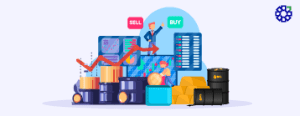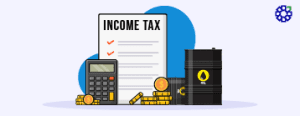What is MCX in Trading?
- 18th August 2025
- 12:00 AM
- 7 min read
If you are looking for commodity trading, you might have heard about MCX. However, what it is and what actually MCX full form stands for is still a big question among newcomers. MCX stands for Multi-Commodity Exchange of India, which was founded in 2003.
Given the importance of commodities to the world economy, understanding MCX trading can help you remain ahead of the fast-paced markets of today. This blog explains what is MCX and how to trade on it.
What is MCX Trading?
Multi-Commodity Exchange of India Ltd., or MCX, is an exchange and a digital platform that facilitates online trading of commodity dealers. This commodity futures market held a commanding 97% market share in 2024.
Investors can settle commodity futures transactions using this exchange in India. With this exchange, you will get a practical and effective platform for hedging activity. By agreeing to purchase or sell commodities at a fixed price on a given future date, traders on the MCX lock in the current price.
Commodities You Can Trade on MCX
Since you got the idea of what is MCX in share market, let us have a look at the different types of commodities you can trade on the MCX:
-
Agricultural Products
Rice, soybean, wheat, cotton
-
Metals
Gold, Silver, aluminium, copper, and nickel
-
Energy
Futures in crude oil and natural gas
-
Softs
Coffee and Sugar
Factors Influencing MCX Commodity Prices
Several important factors affect commodity pricing on the MCX, which are described below:
-
Demand and Supply
Demand and supply are two of the most significant factors that affect commodity prices on the MCX. However, it varies over time based on the time of year and both domestic and international considerations.
-
Weather
Interestingly, the weather conditions have a significant impact on agricultural products like sugar and cotton. An increase in price increases may result from floods or droughts.
-
Technology
Technological developments are one of the important factors that influence the price of commodities. Raw materials, labour, licensing, and taxes are some of the expenses included in it. Long-term technological developments may also lead to increased yields, which would reduce the manufacturing’s marginal cost.
-
Geopolitical Concerns
Commodity trade prices on the MCX are influenced by geopolitical factors both directly and indirectly. For instance, political instability across the globe can lead to a spike in oil prices.
Essential Features of Commodity Trading on MCX
-
Portfolio Diversification
You can diversify your risk by adding commodities to your portfolio along with stocks and other assets. This diversification might result in a better-balanced investment portfolio.
-
Protection Against Inflation
Trading commodities on MCX can help you stay protected with rising inflation. Inflation leads to a decrease in the value of the currency and consequently impacts the value of equities and bond assets. However, due to their high inherent value, commodities like gold and silver continue to hold their value.
-
Hedging
Commodities on MCX can help you hedge. Sugar, iron, corn, and copper are examples of commodities that are important inputs for many different businesses. To hedge against price swings, you can hold an opposite position in the commodities futures market.
-
Liquidity
Trading on commodities markets like MCX is different from buying physical commodities. MCX allows the buying and selling of commodities without any delay.
-
Time Advantage
If you are unable to trade actively throughout the day, you might benefit greatly from MCX trading. If you are busy during working hours, you may trade in the evenings since the trading hours are from 9:00 AM to 11:30 PM IST.
How to Trade on MCX – Step-by-Step Process
You can trade on the MCX by following the steps below:
- Select a registered broker and finish the Know Your Customer (KYC) process to open a trading account.
- Choose a commodity of your choice from categories such as energy, metals, or bullion.
- To begin trading, deposit some funds into your trading account. Your deposit should be sufficient to fulfil your margin and trading capital needs.
- You can buy or sell contracts according to market strategy and specify the quantity, amount, and other relevant information.
- Track your positions and terminate contracts before they expire.
How to Open an MCX Trading Account?
Before you start trading commodities on the MCX, you can open a Demat and trading account with PL Capital Group – Prabhudas Lilladher. PL offers you numerous powerful tools and research-backed trading strategies. Here is a step-by-step guide for opening a trading account with PL Capital:
- Go to any app store and download the PL Capital app.
- Select ‘Profile’ from the ‘Account’ section.
- Fill in the relevant fields with your email address and mobile number. For verification, enter the two OTPs that were sent to your email address and mobile number.
- For e-KYC, input your name and PAN as seen on your PAN card.
- Verify the OTP that is sent to your Aadhaar-linked mobile number to confirm your Aadhaar number.
- Your Demat cum trading account will be created once you grant access to your Digilocker.
Different Options for Investing in Commodities in India
There are different categories of commodities you can invest in India. Some of them are:
-
Physical Commodities
Investing in the commodity market involves buying commodities physically, hoping for price increases and selling them for profit. Precious metals like gold and silver are among the best commodities to own in India.
-
Commodities Associated Stocks
You may purchase shares in companies that deal with commodities to reduce the risks of future trade. You may profit from changes in commodity prices and receive rewards in the form of share price increases by investing in these stocks.
-
Commodity Futures Market
With futures contracts, traders may purchase or sell a commodity at a specific time and date. Those who want to benefit from the volatility of commodity prices can trade futures contracts.
Final Thought
Commodity trading in India is transparent, easy to access, and safe due to the MCX market. It enables traders to hedge risks, diversify their holdings, and safeguard their money from inflation.
Knowing the MCX full form is also necessary for beginners since the commodity market can help them to avail lucrative opportunities, regardless of their level of experience. You can also trade in commodities using the trading account with PL Capital. PL Capital offers different features like real-time market scanners and smart alerts.
Frequently Asked Questions
1. What distinguishes the NSE from the MCX?
The National Stock Exchange (NSE) and the Multi-Commodity Exchange (MCX) are different platforms. The NSE allows you to trade stocks, mutual funds, and bonds, while the MCX focuses on commodity derivative trading.
2. How much money is needed to trade MCX?
The amount of money needed to trade on MCX is determined by the margin requirements for the particular commodities contract you purchased.
3. Can gold be purchased on MCX?
Yes, you can purchase gold on MCX in different forms. These include Gold Mini, Gold Guinea, and Gold Petal and many other forms.
4. Who regulates MCX?
The Securities and Exchange Board of India (SEBI) regulates the MCX.





